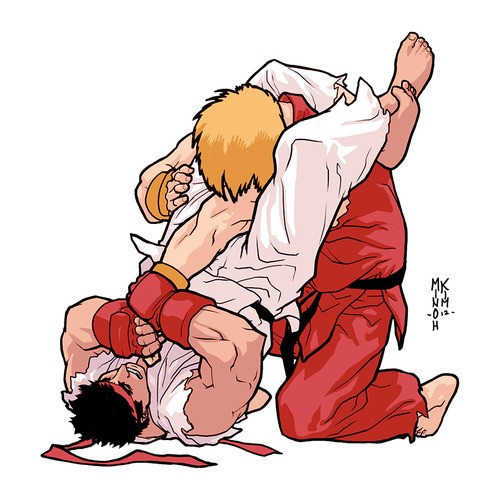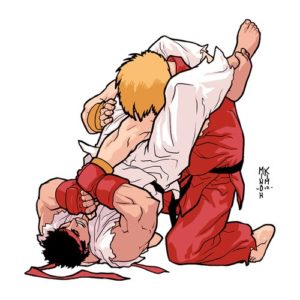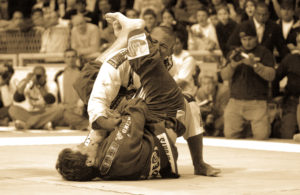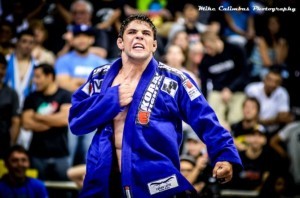1. Good Jiu-Jitsu technique exists when you’re a hammer (offense) and when you’re a nail (defense). Therefore, it doesn’t matter whether you are “losing” or “winning”, in a “bad” position or a “good” one. You should be working on improving those positions.
2. Don’t hero-worship the Upper Belts. Fight the technique and positions, not the reputation and belt of the person.
3. What seems like a blur of indiscernible action (i.e. a scramble) can be broken down into its component parts once you are able to accurately perceive the situation. It seems hard to believe when you’re first starting but you can become a better scrambler.
4. Throughout your Jiu-Jitsu journey, you will have periods when you think you know what’s going on. You don’t. There will always be more to learn.
5. The goal is Black Belt, not Blue Belt. Keep short-term goals in perspective with long-term ones.
6. Good instructors have a method to their madness. Just because you can’t see it, doesn’t mean its not there. How do you know if an instructor is good? Look at his students and their accomplishments.
7. Learn a triangle choke from both an offensive and defense standpoint i.e. both arms in or both arms out. Triangles are very confusing for beginners to understand so the sooner you learn them, the better.
8. Learn underhooks and overhooks. This is the basis of the half guard.
9. Learn how to keep base in the Closed Guard and open it. Most students find this BORING but its one of the most important, most neglected aspects of Brazilian Jiu-Jitsu.
10. Escapes from submissions and positions are low %. The best escape artist in the world will not escape 100% of the time against a comparable opponent. With escapes, you’re looking to go from like a 5% chance of escape to a 10% chance.
11. Being in the right position solves more problems than having good escapes. Being in the right position also creates more offense than exploding.
12. Extended arms are broken arms.
13. The best time to escape or score is before the person settles. This means you should resist until the position change is truly done (understanding when it’s truly done comes with time)
14. Learn the IBJJF Scoring System. You should know the rules of the “sport” you are involved with.
15. Don’t be afraid to ask questions. Most instructors like the student who is genuinely curious about learning.
16. Understand WHY people do particular things. You’ll hear a lot of ‘rules’, sometimes conflicting, and all these rules have a logic behind them. As you progress, seek to understand why.
17. Don’t reinvent the wheel (yet)! The fastest easiest way to improve your Jiu-Jitsu is to listen to your coach and learn his “recipe”. You can customize and add your own twists later.
18. Study outside the classroom but determine who is #1 authority You have to decide if you are going to listen to your coach or the YouTube guy as authority #1. It doesn’t mean that the information is wrong but different “experts” often have different opinions. I recommend you listen to your actual coach since he works with you in-person.
19. There is always going to be a SUPER TALL / SUPER FLEXIBLE / SUPER STRONG guy that you have to deal with. Train with him a lot. Learning to deal with different body types is part of Jiu-Jitsu.
20. There is always going to be a SUPER BAD student. You can learn from him / her too. Don’t get a superiority complex because we all start in different places and this same student could be smashing you in a few years.
21. Keep a notebook. This is not for recall but reflection. Putting Jiu-Jitsu into words is so difficult that it will force you to really think about Jiu-Jitsu in a different way.
22. Physical conditioning will allow you to train in a clearer state of mind. You’ll be able to focus more on the moment at hand rather than combating fatigue. Therefore, anything you do to keep your body healthy will help your Jiu-Jitsu.
23. Some practices are nose-to-the-grindstone bangers and others are all technique and concepts. Don’t think you can skimp on either.
24. Competing will teach you a lot about your Jiu-Jitsu, your mindset, and your physical preparation. People who dedicate themselves to competing regularly usually improve more quickly.
25. There will never be a perfect time to compete. You’ll always be busy, slightly injured, have smarter things to do with your money, etc.
26. You’re going to be sore. It goes away but not if you take a break every time it happens.
27. Train consistently. A steady routine is better for most beginners than going all in from the start. Remember you have been used to spending that time doing other activities so if all of a sudden you start spending that time doing other shit, you’re going to have a reckoning coming soon.
28. If you roll like it’s the finals of the Worlds every time or hold submission holds too long, you are going to run out of training partners real quick AND the only people who will roll with you are people who want to teach you a lesson. I’ve generally found people who do this are usually very nervous when they roll and it’s a matter of a lack of ability to relax rather than some sort of sadism which leads to…
29. RELAX. The benefit of being able to relax goes beyond not getting winded. You need to relax in order to perceive what is going on around you and break it down afterwards.
30. Learn a little bit each day. If you get fixated on learning everything, you won’t learn anything.
31. The details are important but focus on the big things first. You often need to learn gross body movements before small ones. If you have to think about which wrist to grab with which hand for a Kimura, get that first and add in the details later.
32. Learn the Fundamentals. Techniques like mount escapes are not very glamorous but will be necessary from White Belt until Black Belt. You’re going to have to learn the fundamentals sooner or later so you might as well make it sooner.
33. What you’re doing outside the Academy plays as much of a role in your progress as what happens inside it. Live a healthy lifestyle.
34. If a movement or technique feels too hard, you’re probably doing it wrong.
35. Find the Right Academy. First thing, make sure the teacher actually knows what he is talking about (do a little research on his students – not his own credentials). Secondly, visit the school to see if the atmosphere is what you’re looking for.
36. Don’t resist moves in drilling. You and your partner need to learn the moves before you can add resistance.
37. Never believe a move won’t work on you just because another White Belt can’t do it on you. For example, big guys often don’t respect triangles because they don’t have a person large enough & technical enough to do it on them. When they finally meet that technical big guy, its an eye-opener.
38. Gi and No Gi complement each other. If your goal is to be a better grappler, you should do both. Its all about learning how to manipulate the human body (yours and your opponent’s).
39. Not everything you learn or every technique you practice has to be 100% directly applicable in order to be valuable.
40. White Belt matches look different than Blue Belt matches. Blue Belt matches look different than Purple Belt matches. Brown Belt matches look different than Purple Belt. Etc. Just because you don’t see something happen at one belt doesn’t mean it doesn’t work. Conversely, just because something works at the lower levels doesn’t mean it will continue working at the higher levels.
41. Don’t make stylistic choices at White Belt. Do what works and create your style based on that.
42. Knowing a lot of Jiu-Jitsu doesn’t mean you can do it. I remember an old interview with Saulo Ribeiro where he said he could teach someone all the Jiu-Jitsu he knew in a few months but that the person wouldn’t be able to do it. Don’t be that guy.
43. Learn takedowns. It will help especially at the higher belt levels and especially in competitions.
44. Learn Jiu-Jitsu. Not just how to defend against it.
45. You’re going to be clumsy executing new technique. That’s normal. Getting the technique correct at faster and faster speeds is what drilling is for.
46. Try. Effort and technique are not enemies. Anyone can have beautiful technique in non-stressful slow-moving situations. Beautiful technique when you have only a split second against a strong opponent is a different story.
47. After a few months of training, you’ll have an “A” game and a “B” game. But don’t worry about that in the beginning when everything is “B”.
48. To truly improve, you have to improve your strengths as well as your weaknesses. Your strengths have to work against upper belts and your weaknesses against lower ones. Don’t use your best stuff against people who are worse than you.
49. Tap if you need to. If you resist too long and you get injured, that’s your fault.
50. A Black Belt is a White Belt who Never Quit. This is cliche but still important to remember. Everyone starts by getting tapped out.
51. Recognize positions. Do some research on what the names for various body positions are and be calm enough in training to recognize when these positions occur. Once you identify your weak areas, you’ll be able to fix them. But you need to recognize them first!
52. Don’t keep a tap count. It’s a REALLY good way to get discouraged quickly.
53. Leave your ego at the door means keeping a learning attitude. It means focusing on future development even if it means you get submitted or lose positions here and there. It does not mean don’t try to win.
54. Don’t brag or celebrate about tapping someone. Act like you’ve been there before!
55. Don’t worry about belts. Worry about skill development. Constantly talking about belts is a good way for your instructor to think you’re a douche.
56. I know World Champions who are short and stocky that play Spider Guard and tall lanky ones that play Deep Half. Don’t limit yourself by your body type before you actually try to learn the system.
57. Save the coaching and teaching for Upper Belts.





